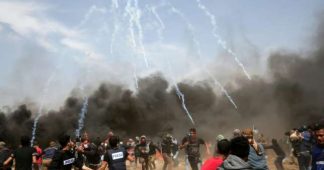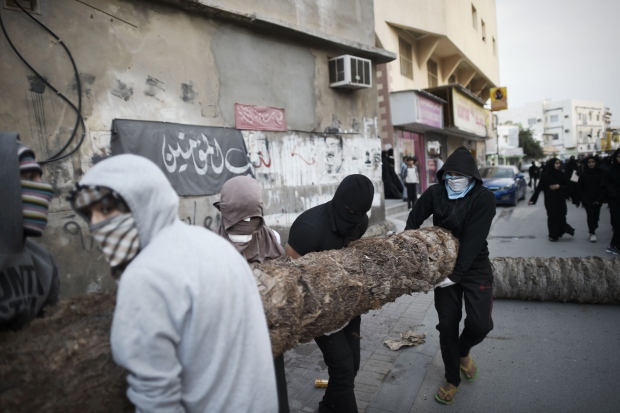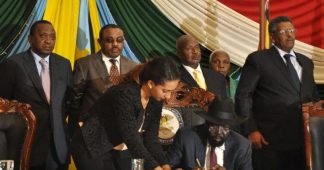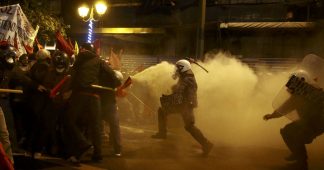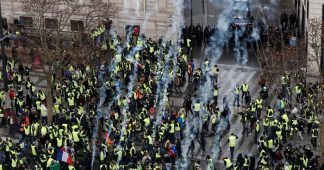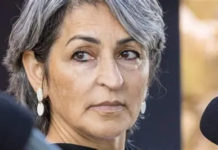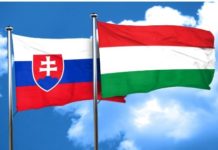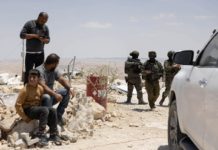By Jean Shaoul
29 December 2018
At least 37 people have been killed and 219 injured during protests opposing the Sudanese government of president Omar al-Bashir. Hundreds more have been arrested in a brutal crackdown on demonstrations against the rising cost of basic commodities including bread.
Among those arrested were 14 leaders of an opposition coalition, the National Consensus Forces, including its leader, the 85-year-old Farouk Abu Issa, who is in poor health, a senior leader of Sudan’s Communist Party, as well as leaders from the pan-Arab Ba’ath and Nasserist parties. Authorities have also blocked social media sites and disrupted internet services to stop protesters communicating.
Yesterday, security forces fired tear gas at hundreds of protesters following Friday prayers outside a mosque in Omdurman, part of the Greater Khartoum conurbation.
The protests initially broke out on December 19 over the tripling in the price of bread and fuel shortages in the northeastern city of Atbara, where protesters torched the ruling National Congress Party’s offices. Atbara, is known as the “City of Steel and Fire” because of its historical importance to the rail network and the presence of a militant rail workers’ trade union that was dismantled under military rule in the 1980s.
The protests rapidly spread across Sudan’s major towns and cities, including the Riverain region—reputedly the regime’s stronghold—and the capital Khartoum, with demonstrators torching the party’s offices in Dongola. Within 24 hours, the demonstrations had escalated into a more generalized expression of opposition to years of austerity, economic hardship and suppression of the most basic democratic rights that make life intolerable for most Sudanese people, particularly the youth. In Khartoum, the average age of protesters is reportedly around 17 to 23 years.
Within two days of the protests starting, the government imposed curfews and states of emergency in several cities, deploying the army around the country. It ordered the police to use tear gas wherever there were large crowds, so that they fired tear gas against fans leaving a football match immediately after they exited the stadium in Khartoum.
Earlier this week, with thousands demonstrating peacefully in what was described as the largest of its kind in years in central Khartoum calling for the ouster of President Bashir—in power since a military coup in 1989—and his regime, security forces fired live ammunition to prevent protesters reaching the presidential palace. The Sudanese Professionals Association had called Tuesday’s demonstration “to direct our voices and our strength towards removing this regime that has devastated us and divided our country.”
Sudan’s workers and poor farmers face a massive hike in prices, with inflation running at nearly 70 percent last September. According to a Reuters report of market vendors’ prices last month, the cost of a kilo of flour had risen 20 percent, beef by 30 percent and potatoes 50 percent.
With prices spiraling, there has been a huge demand for cash, leading to hour-long queues at ATMs that often run out. This has followed the government’s sharp devaluation of the Sudanese pound last October and the central bank’s policy of restricting the money supply to shore up the currency and prevent a run on the banks, leading to a liquidity crunch and a shortage of cash.
People have been forced to turn to the black market, but with the pound losing at least 25 percent of its value against the US dollar in the last month alone, the cost has become exorbitant.
The government’s brutality has only fueled the protests. On Thursday, the Sudanese Journalists’ Network announced that its members were starting a three-day strike in solidarity with the protesters and in opposition to the government’s crackdown. Journalists have faced the regular confiscation of newspapers by the security forces, along with beatings and arrests of those covering demonstrations.
The Sudanese Professionals’ Association, that includes doctors and other professional workers, began a nationwide strike Monday, saying that the work stoppage aimed to “paralyse” the government and deny it much-needed revenue.
The Sudanese Communist Party issued a statement calling on opposition groups to continue the protests, saying, “We urge the Sudanese people to continue their demonstrations until success is achieved by overthrowing the regime.”
The country’s largest political parties, Umma and Democratic Unionist, are also demanding that Bashir step down.
Bashir, who spoke on the crisis for the first time on Monday, tried to downplay the protests as based purely on economic frustrations. He refused to increase the bread subsidies, saying he would not “surrender to our enemies.” Claiming that “Some mercenaries serving the agendas of our external enemies are exploiting the lack of some commodities to sabotage our country,” he warned people to ignore “attempts to instill frustration.”
His assistant and deputy of the ruling party, Faisal Hassan Ibrahim, said the protests were “coordinated and organized” and that two of those killed in demonstrations in the city of al-Qadarif were from the armed forces, leading to the deployment of the military across the country.
That Sudan’s ruling elite has responded with such ferocity to these demonstrations testifies to the depth of the economic and political crisis. Sudan, a country of more than 40 million people, has never recovered from South Sudan’s secession in 2011, after nearly 30 years of civil war. Secession was largely orchestrated by the US in an attempt to disrupt China’s growing economic influence in the Horn of Africa. Following the secession, Sudan lost three-quarters of its oil output, a crucial source of foreign currency.
Although Sudan endured harsh US sanctions, imposed in the 1990s following allegations by Washington that Khartoum was aiding international terrorism, US-Sudan relations have warmed somewhat. Last year, the Trump administration lifted the sanctions, largely due to pressure from the Gulf monarchies, including Saudi Arabia and the United Arab Emirates, following Sudan’s dispatch of some 1,000 ground troops to fight with the Saudi-led coalition in Yemen. There were promises of Saudi investment, after Sudan cut diplomatic ties with Iran in January 2016.
Nevertheless, Washington set conditions for the full normalisation of ties, with the result that Sudan’s economy has seen few benefits and there has been a falling out between different factions within the ruling clique.
In January, the government introduced austerity measures that included cutting subsidies on wheat, electricity and other essential goods, sending prices soaring and sparking wide protests the government managed to suppress by arresting hundreds of people.
Last April, Foreign Minister Ibrahim Ghandour, reportedly in favour of meeting US conditions, was sacked for indicating the scale of the economic crisis confronting the government. He had told parliament that his ministry was facing a financial crisis and needed $30 million to cover its costs, adding, “Sudanese diplomats have not received their salaries, and paying rent for diplomatic missions has also been delayed.”
Bashir can count on the support of the region’s dictators, all of whom fear for their own shaky regimes. Egypt was quick to voice its support, while Qatar reportedly offered “all that was necessary to help Sudan overcome this ordeal…” Qatar and the Gulf States, which have been an important source of funding for Sudan since the secession of South Sudan, as well as Turkey have been competing for influence in the Horn of Africa.
Earlier this month, Bashir was dispatched to Damascus to put out feelers on behalf of Riyadh and Abu Dhabi to Syrian President Bashar al-Assad. It was part of a broader effort to reduce Tehran’s influence in the war-torn country, under conditions where the Gulf States have lost influence in the Levant, Lebanon, Syria and Iraq.
The US, Britain, Norway and Canada have issued a joint statement expressing their concern about the use of live ammunition on the demonstrators and calling on all parties to avoid violence or the destruction of property, while affirming the right of the Sudanese people to peacefully protest to express their “legitimate grievances.”
